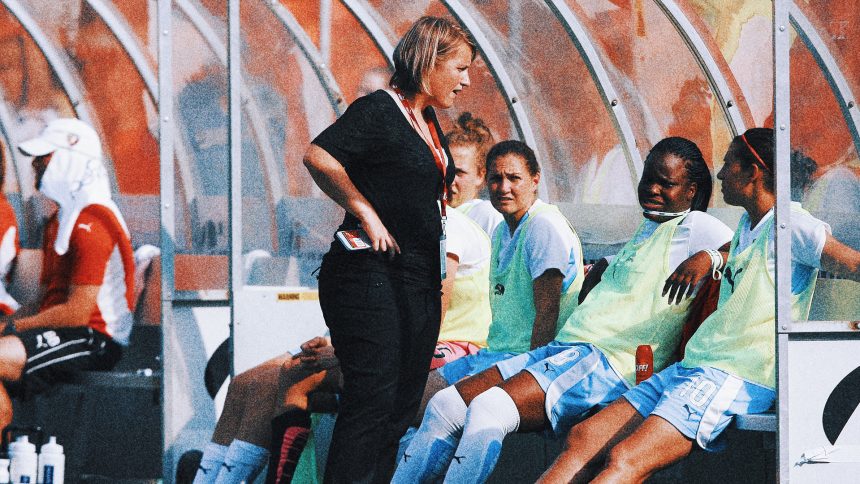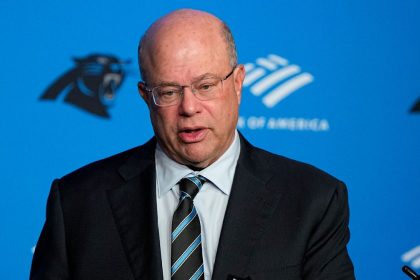Billed as the best coach in the world when U.S. Soccer lured her away from English club Chelsea last November and hired her to lead the women’s national team, it’s taken Emma Hayes just seven games to return the most decorated program in women’s soccer history to its hard-won spot atop the sport.
Less than a year after a disastrous showing at the 2023 Women’s World Cup, the Americans have been the best team at the ongoing Olympics in Paris. For just the second time ever, the USWNT went a perfect 3-0 during an Olympic group stage that included a 4-1 pasting of Germany, FIFA’s fourth-ranked side. (The U.S., which until last year had never sat worse than second since the ranking began in 2023, are fifth.)
The most important tests await for Hayes and her electric young squad, which is fronted by star forwards Trinity Rodman, Sophia Smith and Mallory Swanson. The U.S. meets Japan in Saturday’s quarterfinal, a rematch of the 2012 gold medal game — the most recent of the Americans’ four Olympic triumphs.
A podium finish remains the bare minimum expectation for the USWNT at these Games —even if Hayes, who took over in May after Chelsea’s season ended, has barely had enough time to get to know her squad.
ADVERTISEMENT
Still, nobody should be surprised by Hayes’ instant success at the international level. Among the many talents the 47-year-old London native possesses, the ability to squeeze the maximum out of her teams is perhaps the superpower that sets her apart the most.
Long before winning seven consecutive FA Women’s Super League titles with the Blues, Hayes was a young coach trying to make it in a strange land. She moved to the U.S. in the early 2000s with a dream and not much else, eventually landing with the semipro Long Island Lady Riders. But her big break came in 2003, when she applied for and got the open job at NCAA Division 1 Iona College, a small private university just north of New York City.
Iona wasn’t an obvious landing spot for a future USWNT coach, to put it kindly. The Gaels had won just four of 34 matches over the preceding two seasons. With around 3,000 undergraduates and 24 men’s and women’s sports to fund, there wasn’t much money for scholarships. The school couldn’t even pay Hayes for most of her first year ther because her work visa hadn’t yet been approved.
“I learned a lot about how to build a program with a limited budget,” Hayes told FOX Sports last month following a media event in midtown Manhattan, just 22 miles from Iona’s New Rochelle campus. “I used to recruit the right fits, mainly East Coast girls out of really tough, blue-nose states like Pennsylvania and New Jersey. For me, those were real fundamental years around really finding bang for your buck.”
Results quickly followed. Iona won nine games in Hayes’ second season and 10 in her third and final year. Her .667 win percentage remains the highest in Gaels history.
“Making our conference championship was like gold for that team,” Hayes said. “We punched above our weight, let’s put it that way.”
That was largely down to the environment Hayes created.
“She was probably the best college coach I’ve ever been around,” said Patrick Lyons, Iona’s then athletic director who later held the same position at Seton Hall University in New Jersey. “You want coaches that can win, but you also want great culture people. That’s what she was.
“People just liked being around her, they gravitated towards her,” added Lyons, who tried to bring Hayes to Seton Hall in the early 2010s. “What she did with Iona, I knew she wasn’t going to stick around long.”
[RELATED: Winner’s circle: South Carolina’s Dawn Staley and USWNT’s Emma Hayes are ‘two of a kind’]
Hayes went back to England in 2006 to become an assistant coach with Arsenal. She briefly returned to the U.S. to helm the Chicago Red Stars before making her name over a dozen wildly successful years with Chelsea. But those formative experiences in New York have stick with her.
“That group from 2003 is one of my favorite teams I’ve ever coached, and I’m still in touch with lots of them,” she said. “Iona meant a lot to me. It shaped me as a coach about how to be invested in players holistically to get the best out of them.”
Now she’s getting the best out of a revamped U.S. team. Few knew what to expect from Americans this summer. The player pool has been turned over to an almost totally new generation; veterans Julie Ertz and Megan Rapinoe retired after the Americans were eliminated from the 2023 Women’s World Cup in the round of 16, their earliest exit ever. Hayes left 35-year-old Alex Morgan, another headliner from the World Cup-winning 2015 and 2019 USWNTs, off her 18-woman roster for these Olympics.
Despite its dominant first round, the U.S. might not have the strongest squad in France. Top-ranked Spain is the reigning world champ. Even after the Americans’ eye-opening rout of Germany, La Roja remained the favorite to claim the gold.
But there’s clearly something special happening with Hayes’ USWNT, which has embraced both its new coach and its unfamiliar role as a dark horse this summer
“I say to people all the time: I haven’t always had the best players,” Hayes said. “Getting the most out of people is something I’ve always prided myself on. The qualities people have, you always want to find their strengths and make them super strengths.”
So far so good.
Doug McIntyre is a soccer writer for FOX Sports who has covered the United States men’s and women’s national teams at FIFA World Cups on five continents. Follow him at @ByDougMcIntyre.
recommended

Get more from United States Follow your favorites to get information about games, news and more











